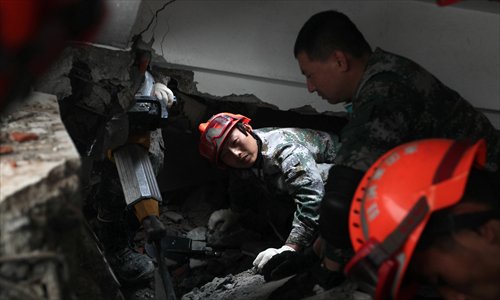HOME >> WORLD
Nepal rescuers face difficult choices in desperate situation
By Bai Tiantian in Kathmandu Source:Global Times Published: 2015-4-30 0:53:02

A rescue team sent by China's People's Liberation Army searches a collapsed residential building in Kathmandu on Wednesday. Photo: Cui Meng/GT
Editor's note:
Search and rescue efforts entered their fifth day in earthquake-hit Nepal after a 7.8-magnitude quake on Saturday killed more than 5,000 people. The Global Times reporters in Kathmandu have witnessed the life-saving efforts and the strength of the Nepalese people in the face of tragedy. Read the full story on globaltimes.cn.
Nepalese people face catastrophe with strength and grace, despite agonizing losses
An elderly Nepalese man on Tuesday grabbed my hand and asked me, with tears welling up in his eyes, if I could get the Chinese rescue team to search his collapsed house just one more time.
"Please. Please. I have family members in there. Four of them. Please," he begged.
The house had already been searched twice, once by the Indian rescue team and once by the Chinese.
The smell emanating from the bodies pinned beneath the rubble of his house was so strong that it filled one's nostrils 20 meters away from the debris.
The man refused to believe that he had lost his loved ones and kept begging. His neighbors, whose homes had survived the tremors that rocked the mountainous nation, begged by his side.
I didn't know what to do.
I was dispatched to Kathmandu on Sunday by the Global Times to cover the quake and have been following the search efforts of the Chinese International Search and Rescue team for the past two days. Since most of the Chinese rescuers do not speak English, I served from time to time as the team's translator. The five-storey building was located in what had been a rather nice neighborhood by the side of the Vishnumati River, a river so holy to the locals that they named it after a Hindu god. But now the river has become a symbol of Nepal's suffering as the areas worst hit by the earthquake in Kathmandu are almost all located alongside the river.
I tried to explain to the old man what the rescuers had told me. It was one of the most difficult conversations I have ever had, trying to explain to someone that his brother, two sons and a daughter-in-law were beyond help. The rescuers had located the bodies, with the help of their trained dogs, under a pile of masonry that was once the family's kitchen. The bodies were buried underneath the home and could not be seen.
The man went silent for a moment. He told the team previously that all four of his relatives were in the kitchen when the earthquake struck. At that moment it had been almost 72 hours since the quake took place, a critical time to look for survivors. But judging by their location and the smell, the team had decided that the chances of finding any survivors was slim. The team made the decision to move on to the next house, where they might be able to find people that may still have a chance to live.
Posted in: Asia-Pacific